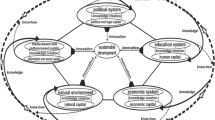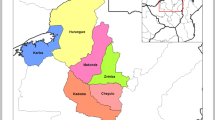Abstract
The study aims at Ghana’s efforts to address inequalities and achieve SDG 10.2 by 2023. It explores Sustainable Development Goal 10.2 on social inequality using Ghana’s Livelihood Empowerment Against Poverty (LEAP). Many low/middle-income countries have focused on poverty and made efforts to eradicate/reduce poverty, but little progress in reducing the inequality gap. Many poor/needy persons/vulnerable persons are excluded from having access to assets across different dimensions and as such realising this goal by 2030 seems almost impossible. Through a qualitative research design, the article used primary and secondary data. The findings revealed the vulnerable in society like the aged, persons living with disabilities, women, and children suffer greater disparity in terms of opportunities like basic services, education, and health. Again, it highlighted Ghana’s effort to reduce inequalities by empowering the underprivileged across social and economic lines to access the necessities of life through various social intervention programmes. Findings revealed these programmes require the coordinated effort of the government and other establishments to implement them within the Ghanaian context. LEAP was identified as a commendable intervention programme that selects vulnerable individuals to reduce the inequality gap. The study recommends that the government make provisions for other funds to cover large-scale the underprivileged in need.
Similar content being viewed by others
Availability of Data and Materials
The data forms part of a bigger project and the data can be made available upon request to the corresponding author.
References
Akaranga, S., & Makau, B. (2016). Ethical considerations and their applications to research: A case of the University of Nairobi. Journal of Educational Policy and Entrepreneurial Research, 3(12), 1–9.
Anderson, C. (2010). Presenting and evaluating qualitative research. American Journal of Pharmaceutical Education, 74(8), 141.
Appiah-Kubi, K. (2003). Education inequality in Ghana. Center for Policy Analysis.
Arfin, S. (2018). Ethical considerations in qualitative study. International Journal of Care Scholars, 1(2).
Barnes, N. (2019). An assessment of the SDG1: A case study of Ghana’s Livelihood Empowerment Against Poverty (Leap) program. University of Ghana.
Binelli, C., Loveless, M., & Whitefield, S. (2015). What is social inequality and why does it matter? Evidence from Central and Eastern Europe. World Development, 70, 239–248. https://doi.org/10.1016/j.worlddev.2015.02.007.
Blackburn, R. (2008). What is social inequality? International Journal of Sociology and Social Policy, 28(78), 25–259.
Bottero, W. (2005). Stratification: Social division and inequality Routledge. https://doi.org/10.4324/9780203339367.
Cooke, E., Hague, S., & Mckay, A. (2016). The Ghana poverty and inequality report: Using the 6th Ghana Living Standards Survey.
Danquah, M., & Ohemeng, W. (2017). Unmasking the factors behind income inequalities in Ghana. International Journal of Social Economics, 44(7).
Davies B., Diadone, S., Handa, S., Park, M., Osei Darko, R., & Osei-Akoto, I. (2014). The impact of Ghana’s LEAP programme, one pager 271. International Policy Centre for Inclusive Growth.
Debrah, E. (2013). Alleviating poverty in Ghana: The case of Livelihood Empowerment Against Poverty (Leap). Africa Today, 59, 40–67.
Ghana Statistical Service (GSS). (2018). Ghana Living Standards Survey 2017. Accra: GSS (GLSS), Report.
Haradhan, M. (2018). Qualitative research methodology in social sciences and related subjects. Journal of Economic Development, Environment and People, 7(1).
Hiraide, L. (2013). Social inequality. AQA GSCE Sociology Unit 2. The BRIT School.
International Labour Organization. (2015). World employment and social outlook. The changing nature of jobs. International Labour Office, ILO Research Department, Geneva.
Institute of Statistical, Social and Economic Research (ISSER). (2018). Ghana social development outlook 2018. Accra: ISSER. https://isser.ug.edu.gh/publications/ghana-social-development-outlook.
Kipo-Sunyehzi, D. D. (2020). Global social welfare and social policy debates: Ghana’s health insurance scheme promotion of the well-being of vulnerable groups. Journal of Social Service Research, 1-15. Publisher: Routledge: Taylor and Francis Group. https://doi.org/10.1080/01488376.2020.1716919
Mason, J. (2002). Linking qualitative and quantitative data analysis. In Analyzing qualitative data (pp. 103–124). Routledge.
Ministry of Gender, Children and Social Protection (MOGCSP) the Livelihood Empowerment Against Poverty-LEAP. (2007). Government of Ghana. Accra: Ministries. https://leap.mogcsp.gov.gh/about-us/background/.
Matyók, T., Senehi, J., & Byrne, S. (2011). Critical issues in peace and conflict studies: Theory, practice, and pedagogy. Lexington Books.
Molini, V., Clementi, F., Mungai, R., & Schettino, F. (2016). All that glitters is not gold: Polarization amid poverty reduction in Ghana. Policy Research Working Paper, 7758. World Bank Group, Poverty and Equity Global Practice Group.
Nowell, L. S., Morris, J. M., & Moules, N. J. (2017). Thematic analysis: Striving to meet the trustworthiness criteria. International Journal of Qualitative Methods, 16, 1–13.
Oduro, A. D., Arhin, A. A., Domfe, G., Alidu, S., Agyeman, K. F., Asimadu, D. E., Walker, J., Gibson, L., Mariotti, C., Hall, S. (2018). Building a more equal Ghana: A five-point action plan to close the gap between the rich and the rest. (Report) Oxfam International, SEND Ghana and Ghana Anti-Corruption Coalition.
Osei-Assibey, E. (2013). Inequalities in Ghana: Nature, causes, challenges and prospects. Briefing paper based on a study by National Development Planning Commission (NDPC) and United Nations International Cultural and Educational Fund.
Pope, C., Ziebland, S., & Mays, N. B. (2000). Qualitative research in health care: Analysing qualitative data. British Medical Journal, 320(7227), 114–116. https://www.jstor.org/stable/25186804.
Ramirez-Faria, C. B. (1989). The origins of economic inequality between nations: An historical synthesis of western theories on development and underdevelopment (PHD Thesis). London School of Economics and Political Sciences.
Regional Forum on Sustainable Development for the UNECE Region. (2019). Reduced inequality “bridging the gap: Achieving greater income and economic equality”. M, S. Egger, (Moderator), Director of the UNDP Regional Bureau for Europe and the Commonwealth of Independent States. Forum conducted in Room 15, International Conference Centre Geneva (CICG).
Sachs, J. (2012). From millennium development goals to sustainable development goals. The Lancet, 379 (9832), 2117–2212. Earth Institute, Columbia University, New York, NY, USA.
Simon, R. M. (2016). The conflict paradigm in sociology and the study of social inequality: Paradox and possibility. Theory in Action, 9(1). https://doi.org/10.3798/tia.1937-0237.16001.
Sustainable Development Solutions Network. (2019). Sustainable development goals report. Transformations to achieve the sustainable development goals. SDGs Index and Dashboard Reports, Bertelsmann Stiftung.
UNCG & CSO. (2017). The sustainable development goals (SDGs) in Ghana, why they matter and how we can help. Retrieved on February 27, 2020 from https://www.undp.org/content/dam/unct/ghana/docs/SDGs/UNCT-GH-SDGs-in-Ghana-Avocacy-Messages-2017.pdf.
UNDP. (2015).Goal 10-reduced inequalities. Retrieved on December 7, 2019 from https://www.undp.org/content/undp/en/home/sustainable-development-goals/goal-10-reduced-inequalities.html.
UN. (2015). Sustainable development goals. Retrieved on December 12, 2019 from https://www.un.org/sustainabledevelopment/inequality/.
UN. (2019). Inequality must be addressed through social protection policies, speakers stress, as commission for social development opens 2019 session. Meeting Coverage, Economic and Social Council, Commission for Social Development. Retrieved from December 12, 2019 from https://press.un.org/en/2019/soc4873.doc.htm.
UN News. (2020). Rising inequality affecting more than two-thirds of the globe, but it’s not inevitable: New UN report. Retrieved on November 9, 2022 from https://news.un.org/en/story/2020/01/1055681.
World Social Report. (2020). Inequality in a rapidly changing world. Chapter 1, Inequality: Where we stand today. Retrieved on November, 20222 from https://www.un.org/development/desa/dspd/wp-content/uploads/sites/22/2020/02/World-Social-Report-2020-Chapter-1.pdf.
Yin, R. K. (2014). Case study research: Design and methods (5th ed.). Sage Publications Inc.
Funding
The study did not receive any external support from the public or commercial sources.
Author information
Authors and Affiliations
Corresponding author
Ethics declarations
Ethical Approval
The study received institutional approval from the Legon Centre for International Affairs and Diplomacy of the University of Ghana and obtained institutional permission from the Ministry of Gender, Children and Social Protection (MOGCSP), the Livelihood Empowerment Against Poverty (LEAP) Secretariat, SDGs Advisory Unit, and the National Development Planning Committee (NDPC), as well as the informed consent of the study participants before the commencement of the data collection in the two regions of Ghana.
Conflict of Interest
The authors declare no competing interests.
Additional information
Publisher's Note
Springer Nature remains neutral with regard to jurisdictional claims in published maps and institutional affiliations.
Rights and permissions
Springer Nature or its licensor (e.g. a society or other partner) holds exclusive rights to this article under a publishing agreement with the author(s) or other rightsholder(s); author self-archiving of the accepted manuscript version of this article is solely governed by the terms of such publishing agreement and applicable law.
About this article
Cite this article
Kipo-Sunyehzi, D.D., Arthur, M.E.Q. & Zaami, M. United Nations Sustainable Development Goal 10.2: Analysis of Social Inequality in Ghana. Glob Soc Welf (2024). https://doi.org/10.1007/s40609-024-00334-w
Accepted:
Published:
DOI: https://doi.org/10.1007/s40609-024-00334-w




